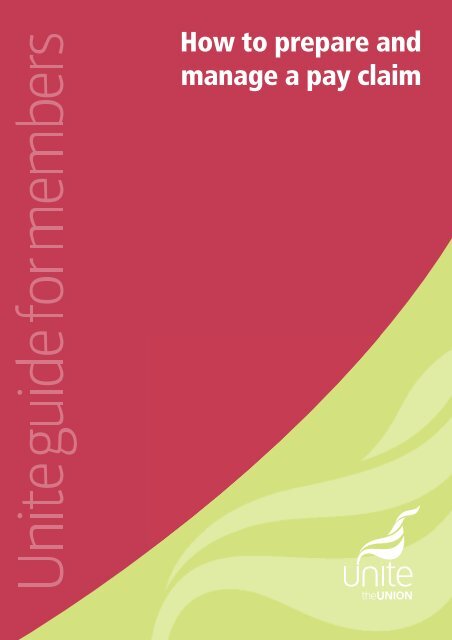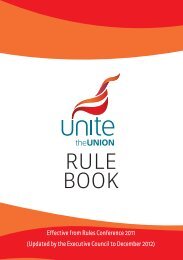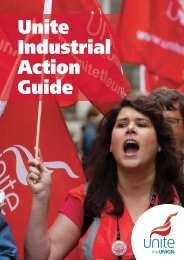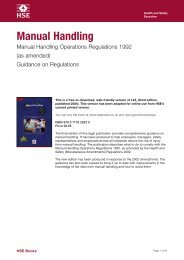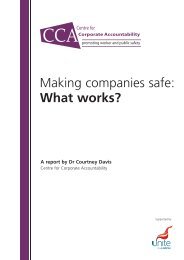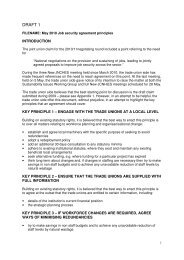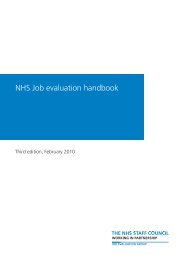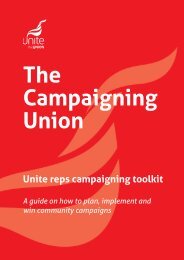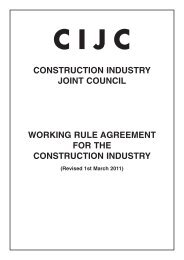How to prepare and manage a pay claim - Unite the Union
How to prepare and manage a pay claim - Unite the Union
How to prepare and manage a pay claim - Unite the Union
You also want an ePaper? Increase the reach of your titles
YUMPU automatically turns print PDFs into web optimized ePapers that Google loves.
<strong>How</strong> <strong>to</strong> <strong>prepare</strong> <strong>and</strong><br />
<strong>manage</strong> a <strong>pay</strong> <strong>claim</strong>
<strong>How</strong> <strong>to</strong> <strong>prepare</strong> <strong>and</strong> <strong>manage</strong> a <strong>pay</strong> <strong>claim</strong><br />
Research Department<br />
2010<br />
Updated 2013<br />
Published by <strong>Unite</strong> <strong>the</strong> <strong>Union</strong><br />
General Secretary Len McCluskey<br />
Updated 2013<br />
<strong>Unite</strong> House<br />
128 Theobald’s Road<br />
Holborn<br />
London WC1X 8TN<br />
Tel: 020 7611 2500<br />
2<br />
This guide book is downloadable in PDF format from<br />
www.unite<strong>the</strong>union.org
Contents<br />
Page<br />
Introduction 4<br />
Strategy/Content 5<br />
Collecting information 7<br />
Company 7<br />
Labour Market 7<br />
Cost of living 8<br />
Executive <strong>pay</strong> 9<br />
Corporate Governance 10<br />
Disclosure of information 11<br />
Special issues 12<br />
Equal <strong>pay</strong> 12<br />
Pay systems 14<br />
Costing a <strong>claim</strong> 15<br />
Presenting a <strong>claim</strong> 15<br />
Engaging <strong>the</strong> members 16<br />
Useful web sites 18<br />
Useful contacts 19<br />
3
n intRoDUCtion<br />
Assisting in <strong>pay</strong> negotiations <strong>and</strong> achieving an up-lift in <strong>pay</strong> is one of <strong>the</strong><br />
fundamental reasons for becoming a representative at a workplace. The<br />
process is a learning experience <strong>and</strong> as such is very rewarding, offering <strong>the</strong><br />
opportunity <strong>to</strong> supply <strong>manage</strong>ment with all <strong>the</strong> information <strong>the</strong>y need <strong>to</strong> agree<br />
an increase in <strong>pay</strong> for <strong>the</strong> workforce.<br />
A clear, concise <strong>and</strong> well thought out <strong>pay</strong> campaign allows for communication<br />
<strong>and</strong> consultation with members, demonstrating <strong>the</strong> significance of <strong>the</strong> union<br />
<strong>and</strong> ensuring <strong>the</strong> involvement of <strong>the</strong> membership in <strong>the</strong> decision making<br />
process. It is also a training <strong>and</strong> development opportunity for representatives.<br />
The production of <strong>the</strong> <strong>pay</strong> <strong>claim</strong> <strong>and</strong> <strong>the</strong> communication involved with members<br />
<strong>and</strong> <strong>manage</strong>ment highlights <strong>to</strong> members <strong>and</strong> non-members how important it is<br />
<strong>to</strong> be a part of <strong>the</strong> process <strong>to</strong> influence <strong>manage</strong>ment <strong>and</strong> ultimately produce a<br />
positive negotiating outcome. It also shows that terms <strong>and</strong> conditions <strong>and</strong><br />
workplace benefits are things <strong>to</strong> be negotiated <strong>and</strong> discussed <strong>and</strong> it is <strong>the</strong> union<br />
representative that undertakes <strong>the</strong>se tasks on behalf of <strong>the</strong> membership.<br />
Every time a <strong>claim</strong> is presented circumstances will be different. In this brief<br />
guide it is impossible <strong>to</strong> address every potential situation <strong>the</strong>refore this guide<br />
focuses upon <strong>the</strong> decisions which determine <strong>the</strong> content <strong>and</strong> shape of <strong>the</strong> <strong>claim</strong>;<br />
<strong>the</strong> information needed <strong>to</strong> inform <strong>the</strong> <strong>claim</strong>; some of <strong>the</strong> special <strong>pay</strong> related<br />
issues which commonly arise; how <strong>to</strong> cost <strong>the</strong> <strong>claim</strong> <strong>and</strong> how <strong>to</strong> engage <strong>the</strong><br />
membership.<br />
4
n stRategY anD Content<br />
The approach <strong>to</strong> any <strong>pay</strong> <strong>claim</strong> will be dependent upon <strong>the</strong> organisation, <strong>the</strong><br />
collective agreement <strong>and</strong> <strong>the</strong> economic circumstances affecting <strong>the</strong> employer<br />
<strong>and</strong> members. Whe<strong>the</strong>r your employer is in <strong>the</strong> private or public sec<strong>to</strong>r will also<br />
impact on <strong>the</strong> strategic approach as will <strong>the</strong> involvement of o<strong>the</strong>r unions where<br />
joint negotiations take place.<br />
It is important <strong>to</strong> underst<strong>and</strong> <strong>the</strong> approach of <strong>manage</strong>ment as well.<br />
It is clear that <strong>manage</strong>ment within a company often have a different set of<br />
criteria or agenda <strong>to</strong> determine <strong>pay</strong> structures than <strong>the</strong> workers in <strong>the</strong> company.<br />
These criteria can include:<br />
• Recruiting <strong>and</strong> retaining <strong>the</strong> best employees<br />
• Motivating <strong>the</strong> workforce<br />
• Achieving company objectives<br />
• Taking advantage of economic downturns <strong>to</strong> reduce <strong>the</strong> <strong>pay</strong> bill<br />
• Giving high <strong>pay</strong> awards <strong>to</strong> favoured individuals<br />
• Act in a confrontational way <strong>to</strong> reduce collective bargaining <strong>and</strong> <strong>the</strong> role of<br />
trade unions.<br />
For unions it is <strong>the</strong> members who set <strong>the</strong> agenda <strong>and</strong> communicate what <strong>the</strong>y<br />
would like <strong>to</strong> see in <strong>the</strong> <strong>pay</strong> negotiations. It is <strong>the</strong> role of <strong>the</strong> workplace<br />
representative <strong>to</strong> ensure that members are consulted <strong>and</strong> feel involved in <strong>the</strong><br />
<strong>pay</strong> <strong>claim</strong> process.<br />
The criteria trade unions adopt would typically include:<br />
• Maintaining <strong>and</strong> where possible improving <strong>the</strong> value of earnings<br />
• Comparing <strong>pay</strong> with o<strong>the</strong>r similar companies <strong>to</strong> benchmark <strong>pay</strong> rates in <strong>the</strong>ir<br />
company<br />
• To encourage fair internal relativities <strong>and</strong> range of earnings<br />
• To promote <strong>the</strong> equal treatment of all employees in <strong>pay</strong> <strong>and</strong> grading<br />
• To ensure people doing <strong>the</strong> same job are getting <strong>the</strong> same <strong>pay</strong><br />
• To promote a link between <strong>the</strong> national minimum wage <strong>and</strong> apprentice <strong>pay</strong> if<br />
<strong>the</strong>re are no current <strong>pay</strong> rates for apprentices that are linked <strong>to</strong> existing <strong>pay</strong> in<br />
<strong>the</strong> company.<br />
5
Content of <strong>the</strong> <strong>claim</strong><br />
This will vary considerably by sec<strong>to</strong>r <strong>and</strong> by company <strong>and</strong> will reflect <strong>the</strong><br />
members’ wishes <strong>and</strong> aspirations. For workplace representatives this is an<br />
opportunity <strong>to</strong> demonstrate leadership <strong>and</strong> provide guidance <strong>and</strong> advice <strong>to</strong> <strong>the</strong><br />
members on <strong>the</strong> arguments <strong>to</strong> support <strong>the</strong> <strong>claim</strong> <strong>and</strong> <strong>the</strong> contents.<br />
Contents may well include conditions of employment o<strong>the</strong>r than <strong>pay</strong> but this<br />
guide will focus on <strong>pay</strong> <strong>and</strong> some specific <strong>pay</strong> related issues.<br />
In determining <strong>the</strong> level of <strong>pay</strong> dem<strong>and</strong> some of <strong>the</strong> key arguments which can<br />
be used by negotia<strong>to</strong>rs are:<br />
• Increases on cost of living/inflation<br />
• Proper reward for contributions <strong>to</strong> productivity improvements <strong>and</strong> efficiency<br />
/cost reductions<br />
• An employer’s ability <strong>to</strong> <strong>pay</strong><br />
• Comparison or narrowing <strong>the</strong> gap with o<strong>the</strong>r grades of worker<br />
• Reward differential between workers’ <strong>and</strong> executive <strong>pay</strong>; <strong>and</strong><br />
• Establishing equality of <strong>pay</strong>.<br />
This guide examines <strong>the</strong>se issues <strong>and</strong> provides links from which fur<strong>the</strong>r<br />
information can be obtained.<br />
6
n CoLLeCting inFoRMation<br />
In order <strong>to</strong> produce a credible <strong>pay</strong> <strong>claim</strong>, negotia<strong>to</strong>rs need <strong>to</strong> be able <strong>to</strong> access<br />
information which will help inform <strong>the</strong> content. Set out below is a brief guide<br />
as <strong>to</strong> where key information can be obtained.<br />
Company/organisation<br />
Central <strong>to</strong> this is underst<strong>and</strong>ing <strong>the</strong> company/organisation that you work for<br />
<strong>and</strong> much of <strong>the</strong> information you need can be found from <strong>the</strong> members in <strong>the</strong><br />
bargaining group. <strong>How</strong>ever, more detailed information about <strong>the</strong> employer’s<br />
finances <strong>and</strong> business is crucial in building <strong>the</strong> arguments <strong>to</strong> support <strong>the</strong> <strong>claim</strong>.<br />
It is very important that <strong>the</strong> accounts of <strong>the</strong> company concerned are analysed<br />
<strong>and</strong> any relevant information such as turnover, operating profit, profit before<br />
tax <strong>and</strong> interest, net profit, net assets, <strong>the</strong> number of people employed <strong>and</strong><br />
what <strong>the</strong> direc<strong>to</strong>rs or chief executive are <strong>pay</strong>ing <strong>the</strong>mselves including any<br />
bonuses or share options. <strong>Unite</strong> has published a guide <strong>to</strong> company accounts <strong>and</strong><br />
how <strong>to</strong> use <strong>the</strong>m. This can be accessed by members on <strong>the</strong> <strong>Unite</strong> website,<br />
http://www.unite<strong>the</strong>union.org/unite-at-work, under information <strong>and</strong> resources<br />
section.<br />
This information <strong>and</strong> analysis can also be supplied by <strong>the</strong> <strong>Unite</strong> Research<br />
Department – as long as adequate notice is provided. For fur<strong>the</strong>r information<br />
contact research.enquiries@unite<strong>the</strong>union.org. For larger organisations some<br />
information will be available from its own website <strong>and</strong> press/media sources.<br />
Labour Market<br />
Comparisons with <strong>the</strong> labour market <strong>and</strong> <strong>pay</strong> rates in similar organisations or<br />
professions can be useful weapons. Access <strong>to</strong> such information is available in<br />
part through <strong>the</strong> <strong>Unite</strong> Pay <strong>and</strong> Conditions Database which has hundreds of <strong>the</strong><br />
latest <strong>pay</strong> settlements <strong>and</strong> details from o<strong>the</strong>r organisations represented by <strong>Unite</strong><br />
<strong>and</strong> o<strong>the</strong>r unions.<br />
Access <strong>to</strong> this database is available <strong>to</strong> members in <strong>the</strong> information <strong>and</strong> resources<br />
section of <strong>the</strong> <strong>Unite</strong> website under information for negotia<strong>to</strong>rs.<br />
7
Cost of living<br />
The rate of inflation describes <strong>the</strong> level at which prices are rising year on year<br />
<strong>and</strong> is published each month by <strong>the</strong> Office of National Statistics. It reflects <strong>the</strong><br />
difference in prices now as compared with <strong>the</strong> same time 12 months ago. If <strong>pay</strong><br />
were <strong>to</strong> rise simply in line with inflation <strong>the</strong> value of wages would always remain<br />
<strong>the</strong> same. For this reason <strong>the</strong> rate of inflation provides a base line which most<br />
negotia<strong>to</strong>rs use as starting point upon which <strong>to</strong> calculate <strong>the</strong> dem<strong>and</strong> for an<br />
increase.<br />
The issue is fur<strong>the</strong>r complicated by two facts. Firstly, <strong>the</strong> Government uses two<br />
different rates of inflation <strong>and</strong> secondly, an individual’s rate of inflation varies<br />
according <strong>to</strong> <strong>the</strong>ir personal circumstances. Below is information <strong>and</strong> advice on<br />
how <strong>to</strong> address <strong>the</strong>se issues.<br />
Inflation Figures<br />
The two measures most commonly referred <strong>to</strong> are <strong>the</strong> Consumer Price Index<br />
(CPI) <strong>and</strong> <strong>the</strong> Retail Price Index (RPI).<br />
The CPI is a target measure for inflation <strong>and</strong> is <strong>the</strong> basis for <strong>the</strong> Government’s<br />
inflation target that <strong>the</strong> Bank of Engl<strong>and</strong>’s Monetary Policy Committee is<br />
required <strong>to</strong> achieve. It is important <strong>to</strong> note that <strong>the</strong> CPI excludes housing costs:<br />
• Council Tax<br />
• mortgage interest <strong>pay</strong>ments<br />
• house depreciation<br />
• buildings insurance<br />
<strong>and</strong> includes items such as:<br />
• university accommodation fees<br />
• foreign students university tuition fees; <strong>and</strong><br />
• unit trust <strong>and</strong> s<strong>to</strong>ckbrokers charges none of which are included in <strong>the</strong> RPI.<br />
The RPI is <strong>the</strong> most familiar general purpose measure of inflation in <strong>the</strong> <strong>Unite</strong>d<br />
Kingdom. The index represents <strong>the</strong> average measure of change in <strong>the</strong><br />
prices of goods <strong>and</strong> services bought by <strong>the</strong> vast majority of households in<br />
<strong>the</strong> UK.<br />
The RPI is used for a variety of purposes including <strong>the</strong> uprating of state benefits,<br />
pensions, <strong>and</strong> index linked gilts. It has been <strong>the</strong> favoured measure of inflation<br />
for <strong>the</strong> purposes of <strong>pay</strong> bargaining by both employers <strong>and</strong> trade unions for<br />
many years.<br />
8<br />
The RPI is based on a ‘shopping basket’ of goods <strong>and</strong> services bought by a
typical household, <strong>the</strong> content of which is fixed but as prices of individual items<br />
change so does its <strong>to</strong>tal cost. The RPI is based on <strong>the</strong> prices of 650 items in 14<br />
categories. The categories are:<br />
Food<br />
Catering<br />
Alcoholic drink<br />
Tobacco<br />
Housing<br />
Fuel <strong>and</strong> light<br />
Household goods<br />
Household services<br />
Clothing <strong>and</strong> footwear<br />
Personal goods <strong>and</strong> services<br />
Mo<strong>to</strong>ring expenditures<br />
Fares <strong>and</strong> o<strong>the</strong>r travel costs<br />
Leisure goods<br />
Leisure services<br />
During each month price collec<strong>to</strong>rs record around 110,000 prices for over 650<br />
specified goods <strong>and</strong> services, using a variety of shops around <strong>the</strong> country while<br />
information on some charges e.g. TV licenses <strong>and</strong> utility costs are obtained<br />
centrally.<br />
Housing costs are a very significant part of our members’ expenditure <strong>and</strong><br />
<strong>the</strong>refore a measure of inflation which includes <strong>the</strong>se, <strong>the</strong> RPI, is <strong>the</strong> appropriate<br />
measure. As far as <strong>Unite</strong> <strong>and</strong> its negotia<strong>to</strong>rs are concerned it is <strong>the</strong> increase in<br />
<strong>the</strong> RPI not <strong>the</strong> CPI that provides <strong>the</strong> best picture of an overall rise in <strong>the</strong> cost of<br />
living for <strong>Unite</strong> members.<br />
CPI is however increasingly becoming <strong>the</strong> favoured inflationary measure being<br />
used by employers <strong>to</strong> determine <strong>pay</strong> increases. From March 2013 two new<br />
measures of inflation are also available - RPIJ <strong>and</strong> CPIH. The RPIJ is a variant of<br />
RPI calculated using a method that meets international st<strong>and</strong>ards. CPIH is based<br />
on CPI however includes some housing costs.<br />
Negotia<strong>to</strong>rs also need <strong>to</strong> bear in mind that <strong>the</strong> national UK inflation figure is an<br />
average <strong>and</strong> for individuals <strong>the</strong> real rate of inflation will often vary as <strong>the</strong><br />
essential items for living may increase at a faster rate than non essentials. Full<br />
details of <strong>the</strong> Retail Price index <strong>and</strong> inflation measurements are available at:<br />
http://www.statistics.gov.uk/statbase/Product.asp?vlnk=868<br />
<strong>Unite</strong> also publishes <strong>the</strong> latest figures each month in <strong>the</strong> bargaining brief <strong>and</strong><br />
on <strong>the</strong> <strong>Unite</strong> website which is available <strong>to</strong> members on <strong>the</strong> information <strong>and</strong><br />
resources section under information for negotia<strong>to</strong>rs.<br />
Executive <strong>pay</strong><br />
Whilst it is quite common <strong>to</strong> make comparisons across similar organisations or<br />
even within your own organisation, it is equally important <strong>to</strong> look at <strong>the</strong><br />
rewards given <strong>to</strong> executive officers <strong>and</strong> senior <strong>manage</strong>ment compared <strong>to</strong> <strong>the</strong><br />
rest of <strong>the</strong> workforce.<br />
9
Recent evidence has identified that <strong>to</strong>p <strong>pay</strong> rates have been increasing at such a<br />
rate that <strong>to</strong>p executives in <strong>the</strong> FTSE 100 companies are earning on average<br />
around 140 times <strong>the</strong> average wage. Whilst this differential will not be repeated<br />
in every organisation or company, it is worthwhile looking at <strong>the</strong> rate of increases<br />
of senior <strong>manage</strong>ment <strong>and</strong> comparing this with recent increases for <strong>the</strong><br />
workforce.<br />
Details of executive <strong>pay</strong> in your organisation will be found in <strong>the</strong> company’s<br />
annual report, if it is a public limited company <strong>Unite</strong> Research Department can<br />
assist in providing details of <strong>the</strong> company accounts.<br />
Corporate Governance<br />
The financial structure <strong>and</strong> ownership of companies is increasingly complex <strong>and</strong><br />
is often a fac<strong>to</strong>r when employers come <strong>to</strong> <strong>the</strong> bargaining table. Many<br />
companies also have far more debt on <strong>the</strong>ir books <strong>and</strong> this can influence <strong>the</strong><br />
behaviour of <strong>manage</strong>ment in negotiations. Debt incurs costs for <strong>the</strong> company<br />
<strong>and</strong> <strong>the</strong> money <strong>to</strong> fund <strong>the</strong> debt is often derived from holding down wages.<br />
This short guide cannot provide all <strong>the</strong> detailed information about corporate<br />
debt but <strong>the</strong> <strong>Unite</strong> Research Department can assist where negotia<strong>to</strong>rs believe<br />
this <strong>to</strong> be an issue.<br />
Just because a company is laden with debt, negotia<strong>to</strong>rs should not accept that<br />
this a reason for holding back on <strong>pay</strong> <strong>claim</strong>s. Employers frequently use <strong>the</strong><br />
burden of debt <strong>to</strong> argue that <strong>the</strong> company must cut costs <strong>to</strong> increase cash flow<br />
<strong>and</strong> that <strong>the</strong>refore a significant increase in <strong>pay</strong> is unaffordable. What is not<br />
normally pointed out is that high levels of debt are often taken on in order <strong>to</strong><br />
fund <strong>pay</strong>ments <strong>to</strong> shareholders through special dividend <strong>and</strong> share buybacks or<br />
<strong>to</strong> fund takeovers.<br />
In preparing your <strong>claim</strong> you need <strong>to</strong> seek out information <strong>to</strong> establish:<br />
• What <strong>the</strong> company has borrowed;<br />
• What is <strong>the</strong> purpose of <strong>the</strong> debt;<br />
• <strong>How</strong> much money has been taken out of <strong>the</strong> company <strong>and</strong> given <strong>to</strong><br />
shareholders;<br />
• What is <strong>the</strong> source of finance <strong>to</strong> <strong>pay</strong> back <strong>and</strong> service <strong>the</strong> debt; <strong>and</strong><br />
• Is value being created or are workers expected <strong>to</strong> <strong>pay</strong> by bearing cost cutting<br />
measures.<br />
10<br />
Some of this information will be available in <strong>the</strong> Notes <strong>to</strong> <strong>the</strong> Company’s<br />
Annual Report <strong>and</strong> Accounts. As with o<strong>the</strong>r enquiries concerning company<br />
accounts assistance is available from <strong>the</strong> Research Department.
Disclosure of information<br />
There is a legal requirement <strong>to</strong> provide information <strong>to</strong> recognised trade unions.<br />
The Trade <strong>Union</strong> <strong>and</strong> Labour Relations (Consolidation) Act 1992 states that every<br />
employer who negotiates with independent trade unions must provide<br />
information which allows <strong>the</strong>m <strong>to</strong> engage in collective bargaining with <strong>the</strong><br />
employer <strong>and</strong> which is related <strong>to</strong> matters <strong>the</strong> union is recognised <strong>to</strong> negotiate<br />
on on behalf of employees.<br />
The Act does not specify exactly what this information should be but <strong>the</strong> ACAS<br />
Code of Practice on ‘Disclosure of Information <strong>to</strong> Trade <strong>Union</strong>s for Collective<br />
Bargaining’ sets out some of <strong>the</strong> relevant items. These include:<br />
i) Pay <strong>and</strong> benefits: principles <strong>and</strong> structure of <strong>pay</strong>ment systems; job evaluation<br />
systems <strong>and</strong> grading criteria; earnings <strong>and</strong> hours analysed according <strong>to</strong><br />
work-group, grade, plant, sex, out-workers <strong>and</strong> home workers, department<br />
or division, giving, where appropriate, distributions <strong>and</strong> make-up of <strong>pay</strong><br />
showing any additions <strong>to</strong> basic rate or salary; <strong>to</strong>tal <strong>pay</strong> bill; details of fringe<br />
benefits <strong>and</strong> non-wage labour costs.<br />
ii) Conditions of service: policies on recruitment, redeployment, redundancy,<br />
training, equal opportunity <strong>and</strong> promotion; appraisal systems; health,<br />
welfare <strong>and</strong> safety matters.<br />
iii) Manpower: numbers employed analysed according <strong>to</strong> grade, department,<br />
location, age <strong>and</strong> sex; labour turnover; absenteeism; overtime <strong>and</strong><br />
short-time; manning st<strong>and</strong>ards; planned changes in work methods, materials,<br />
equipment or organisation; available manpower plans; investment plans.<br />
iv) Performance: productivity <strong>and</strong> efficiency data; savings from increased<br />
productivity <strong>and</strong> output, return on capital invested; sales <strong>and</strong> state of order<br />
book.<br />
v) Financial: cost structures; gross <strong>and</strong> net profits; sources of earnings; assets;<br />
liabilities; allocation of profits; details of government financial assistance;<br />
transfer prices; loans <strong>to</strong> parent or subsidiary companies <strong>and</strong> interest charged.<br />
In addition, public sec<strong>to</strong>r employees may be able <strong>to</strong> rely upon <strong>the</strong> Freedom of<br />
Information Act 2000 (<strong>the</strong> FOIA) which came in<strong>to</strong> force on 1st January 2005 <strong>and</strong><br />
imposed huge new responsibilities on government.<br />
The FOIA provides a right for any individual or organisation <strong>to</strong> access all<br />
recorded information held by a public authority in <strong>the</strong> course of carrying out its<br />
public duties, subject <strong>to</strong> various conditions <strong>and</strong> exemptions. It is not necessary<br />
for <strong>the</strong> person making <strong>the</strong> request <strong>to</strong> provide a justification or explanation for<br />
<strong>the</strong> request. Nor is <strong>the</strong>re a formal procedure for making requests. Any written<br />
request (via letter, email or fax) is sufficient. Any request made should contain a<br />
description of <strong>the</strong> information sought. It is not necessary <strong>to</strong> state formally that a<br />
request is made under <strong>the</strong> FOIA although it is advisable <strong>to</strong> do so. The<br />
11
government department that has responsibility for Freedom of Information is<br />
<strong>the</strong> Ministry of Justice. You can find more information at <strong>the</strong>ir website at<br />
http://www.justice.gov.uk/information-access-rights/foi-requests<br />
Once received, <strong>the</strong> authority is required <strong>to</strong> respond <strong>to</strong> <strong>the</strong> request within 20 days.<br />
It is not permitted <strong>to</strong> charge for <strong>the</strong> information, although where <strong>the</strong> cost of<br />
providing <strong>the</strong> information would exceed £600 (over three days’ work at £25 per<br />
hour) in <strong>the</strong> case of central government, or £450, in <strong>the</strong> case of local government,<br />
<strong>the</strong> authority may refuse <strong>to</strong> provide <strong>the</strong> information. If an authority intends <strong>to</strong><br />
refuse access <strong>to</strong> information under one of <strong>the</strong> FOIA’s exemptions, it must<br />
identify <strong>the</strong> exemption. (So, for example, <strong>the</strong>re is an exemption relating <strong>to</strong> <strong>the</strong><br />
disclosure of information about <strong>the</strong> security <strong>and</strong> intelligence services, <strong>and</strong> in<br />
relation <strong>to</strong> disclosing information contained in court documents. In addition, a<br />
request may be legitimately refused if <strong>the</strong> public interest in maintaining secrecy<br />
outweighs <strong>the</strong> public interest in disclosure). An applicant can <strong>the</strong>n challenge<br />
<strong>the</strong> decision <strong>to</strong> withhold <strong>the</strong> information, first with <strong>the</strong> authority <strong>and</strong>,<br />
ultimately, with <strong>the</strong> Information Commissioner <strong>and</strong> <strong>the</strong> Information Tribunal,<br />
(which has been set up <strong>to</strong> adjudicate upon <strong>and</strong> enforce access rights). In its early<br />
decisions, <strong>the</strong> Tribunal has shown itself perfectly willing <strong>to</strong> go against <strong>the</strong> advice<br />
of <strong>the</strong> Commissioner <strong>and</strong> <strong>the</strong> Ministry of Justice.<br />
The provisions of <strong>the</strong> FOIA may <strong>the</strong>refore be a useful <strong>to</strong>ol if you are seeking<br />
certain types of information about a public sec<strong>to</strong>r employer. <strong>How</strong>ever, you may<br />
want <strong>to</strong> speak <strong>to</strong> your full time officer before making a request under <strong>the</strong> FOIA<br />
<strong>to</strong> ensure that <strong>the</strong> information being requested does in fact fall within <strong>the</strong> remit<br />
of <strong>the</strong> FOIA – remember that <strong>the</strong> duty <strong>to</strong> disclose only applies <strong>to</strong> information<br />
held by public authorities in <strong>the</strong> course of carrying out <strong>the</strong>ir public duties.<br />
n sPeCiaL issUes<br />
Whilst basic <strong>pay</strong> increases will normally be at <strong>the</strong> heart of any <strong>pay</strong> <strong>claim</strong>, it may<br />
be that <strong>pay</strong> related issues also form part of a <strong>claim</strong>. This part of <strong>the</strong> guide draws<br />
attention <strong>to</strong> <strong>the</strong> most common of <strong>the</strong>se <strong>and</strong> points <strong>to</strong> where more detailed<br />
guidance on each issue can be found.<br />
n eqUaL PaY<br />
One of <strong>the</strong> fundamental objectives for <strong>the</strong> union in <strong>pay</strong> bargaining is <strong>to</strong> establish<br />
<strong>pay</strong> levels that are fair <strong>and</strong> non-discrimina<strong>to</strong>ry. Our objective is supported by<br />
equal <strong>pay</strong> legislation which has been in existence for over 30 years.<br />
12<br />
When preparing a <strong>pay</strong> <strong>claim</strong>, if <strong>the</strong>re are concerns about <strong>the</strong> fairness of <strong>the</strong> <strong>pay</strong><br />
levels <strong>and</strong> <strong>the</strong> <strong>pay</strong> system <strong>the</strong>n <strong>the</strong>se will need <strong>to</strong> be addressed. If it is a matter<br />
of correcting past discrimination on grounds of gender or age negotia<strong>to</strong>rs will<br />
need <strong>to</strong> ga<strong>the</strong>r <strong>the</strong> required evidence as part of <strong>the</strong>ir case.
Sex discrimination can operate at different levels of a <strong>pay</strong> system. Without an<br />
equal <strong>pay</strong> audit no company can know if <strong>the</strong>ir <strong>pay</strong> system is discrimina<strong>to</strong>ry. It is<br />
important <strong>to</strong> regularly review each element of a <strong>pay</strong> system, such as performance<br />
ratings, appraisals, ratings, bonuses, job evaluation, benefits, grading, as well as<br />
employment practices relating <strong>to</strong> recruitment <strong>and</strong> promotion.<br />
A step-by-step approach<br />
<strong>Unite</strong> has recently produced a guide for <strong>the</strong> union’s equal <strong>pay</strong> campaign, PayUp.<br />
We recommend following <strong>the</strong> <strong>Unite</strong> step-by-step guide <strong>to</strong> conducting an Equal<br />
Pay Audit in your workplace. This guide provides an 8 step action plan which<br />
includes details on carrying out an equal <strong>pay</strong> audit, information analysis <strong>and</strong><br />
closing <strong>the</strong> gender <strong>pay</strong> gap. For fur<strong>the</strong>r details please refer <strong>to</strong> <strong>the</strong> “PayUp<br />
campaign, <strong>Unite</strong> Action Plan”:<br />
The Equality <strong>and</strong> Human Rights Commission (EHRC) Code of Practice on Equal<br />
Pay recommends a step-by-step approach <strong>to</strong> conducting a review. The Code<br />
suggests that any audit must include all employees, whe<strong>the</strong>r <strong>the</strong>y are full-time,<br />
part-time, a casual employee, a temporary worker, a contrac<strong>to</strong>r or are self<br />
employed. It also recommends that an audit should also look at fac<strong>to</strong>rs where<br />
discrimination might affect <strong>pay</strong>.<br />
Review of <strong>the</strong> Pay System as part of Equal Pay Audit<br />
<strong>Unite</strong> recommends that a review should be undertaken as <strong>the</strong> next step. The<br />
employer should be encouraged <strong>to</strong> initiate <strong>and</strong> cooperate with this <strong>and</strong> <strong>the</strong><br />
Audit as <strong>the</strong>y will <strong>the</strong>n be in a position <strong>to</strong> know whe<strong>the</strong>r or not <strong>the</strong>y are in<br />
breach of <strong>the</strong> Equality Act 2010 <strong>and</strong> good equal <strong>pay</strong> practice.<br />
It is important <strong>to</strong> find out as much of <strong>the</strong> details as possible on gender, job title,<br />
grade/<strong>pay</strong> b<strong>and</strong>s, race <strong>and</strong> ethnic origin, disability, part-time or full-time, agency<br />
or temporary worker, basic <strong>pay</strong>, starting <strong>pay</strong> on appointment, performance ratings<br />
<strong>and</strong> performance, related <strong>pay</strong>, any o<strong>the</strong>r elements of remuneration including<br />
overtime, bonuses, piece-work, profit share etc, on <strong>the</strong> relevant workers.<br />
Make sure women workers as well as men workers are encouraged <strong>to</strong> be involved.<br />
Please also refer <strong>to</strong> <strong>the</strong> Equality <strong>and</strong> Human Rights Commission (EHRC) Code of<br />
Practice on Equal Pay.<br />
A workplace policy on equal <strong>pay</strong><br />
Many employers have equal opportunities policies in relation <strong>to</strong> employment<br />
issues. <strong>Unite</strong> reps need <strong>to</strong> ensure <strong>the</strong> employer makes a commitment <strong>to</strong> equal<br />
<strong>pay</strong> for equal work <strong>and</strong> <strong>to</strong> <strong>the</strong> action needed <strong>to</strong> implement this commitment.<br />
13
To keep equal <strong>pay</strong> on <strong>the</strong> bargaining agenda reps need <strong>to</strong> negotiate a joint<br />
agreement on equal <strong>pay</strong> <strong>and</strong> ensure all employees, particularly <strong>manage</strong>rs <strong>and</strong><br />
personnel staff are trained.<br />
The EHRC recommends that employers introduce an equivalent Equal Pay Policy,<br />
stating <strong>the</strong>ir commitment <strong>to</strong> equal <strong>pay</strong> for all employees, <strong>and</strong> setting out clear<br />
objectives <strong>and</strong> priorities for action <strong>and</strong> a commitment <strong>to</strong> training for <strong>manage</strong>rs<br />
<strong>and</strong> staff.<br />
n PaY sYsteMs<br />
Most members, when asked, would say that negotiating <strong>pay</strong> <strong>and</strong> conditions is<br />
<strong>the</strong> main role of <strong>the</strong>ir trade union. <strong>How</strong>ever, <strong>the</strong> development of <strong>pay</strong> systems<br />
which replace all or part of a general <strong>pay</strong> increase with one linked <strong>to</strong> an<br />
individual’s performance, or <strong>the</strong>ir market rate or <strong>the</strong>ir competence <strong>to</strong> do <strong>the</strong><br />
job, has reduced unions’ influence over <strong>the</strong> <strong>pay</strong> increase that each individual<br />
receives. Such <strong>pay</strong> systems are now used in many companies where <strong>Unite</strong><br />
members work. As a result, general increases <strong>and</strong> incremental systems are now<br />
much less common. <strong>How</strong>ever, such trends far from reducing <strong>Unite</strong>’s role <strong>and</strong><br />
relevance place <strong>the</strong> union in a central position in terms of influencing<br />
employers’ decisions, insisting on transparent, fair <strong>and</strong> equitable <strong>pay</strong> systems<br />
<strong>and</strong> negotiating <strong>the</strong> best outcomes for our members.<br />
For many employers, <strong>pay</strong> systems are a question of following fashion. It is often<br />
<strong>the</strong> case that a particular form of <strong>pay</strong> system will sweep across industry with<br />
little actual evidence of its effectiveness or applicability. Performance-related<br />
<strong>pay</strong> is a good example of this.<br />
Pay systems are more complex than in <strong>the</strong> past <strong>and</strong> <strong>the</strong>refore rarely belong <strong>to</strong><br />
one category or ano<strong>the</strong>r. It is more helpful <strong>to</strong> think of <strong>pay</strong> systems as being<br />
made up of many interchangeable elements which allow for a wide range of<br />
practices.<br />
Pay systems are also much more sophisticated than in <strong>the</strong> past. They may now<br />
be based upon an employer’s view of two things, inputs <strong>and</strong> outputs. Inputs are<br />
<strong>the</strong> skills <strong>and</strong> abilities which an individual brings <strong>to</strong> <strong>the</strong> job. Outputs are <strong>the</strong><br />
results in quality or quantity which <strong>the</strong> individual achieves. A focus on inputs<br />
has created <strong>the</strong> ideas of ‘performance <strong>manage</strong>ment’, ‘competency based <strong>pay</strong>’<br />
<strong>and</strong> ‘skills based <strong>pay</strong>’, which are examined below. Employers are giving greater<br />
emphasis <strong>to</strong> <strong>the</strong> attributes individuals possess <strong>and</strong> less attention is paid <strong>to</strong><br />
length of service or <strong>to</strong> <strong>the</strong> job that is being done.<br />
14<br />
The <strong>Unite</strong> Research Department has produced a guide <strong>to</strong> <strong>pay</strong> systems which<br />
includes job evaluation, performance <strong>manage</strong>ment, competency based <strong>pay</strong> <strong>and</strong><br />
flexible benefits packages. This is available online <strong>to</strong> members from <strong>the</strong> union’s<br />
website.
n Costing YoUR CLaiM<br />
It is important that negotia<strong>to</strong>rs have a clear idea of <strong>the</strong> cost <strong>to</strong> <strong>the</strong> employer if<br />
<strong>the</strong> <strong>claim</strong> is met in full. This provides negotia<strong>to</strong>rs with <strong>the</strong> ability <strong>to</strong> underst<strong>and</strong><br />
how <strong>the</strong> <strong>claim</strong> might be adjusted during <strong>the</strong> negotiations in order <strong>to</strong> secure an<br />
acceptable agreement <strong>and</strong> enables <strong>the</strong>m <strong>to</strong> counter any wild <strong>claim</strong>s from<br />
<strong>manage</strong>ment of <strong>the</strong> costs <strong>and</strong> <strong>the</strong> affordability of <strong>the</strong> <strong>claim</strong>.<br />
In order <strong>to</strong> calculate <strong>the</strong> cost some basic information is essential. This would<br />
include:<br />
• Current <strong>pay</strong> bill<br />
• Number of employees covered by <strong>the</strong> <strong>claim</strong><br />
• Costs of <strong>pay</strong> related items which are affected by any increase in basic <strong>pay</strong>, such<br />
as sick <strong>pay</strong>, pensions, shift <strong>pay</strong> <strong>and</strong> overtime<br />
• Proportion of <strong>pay</strong> bill <strong>to</strong> <strong>to</strong>tal operational costs<br />
• Turnover figures for previous year <strong>and</strong> projections for <strong>the</strong> coming year<br />
• For public authorities <strong>and</strong> not for profit organisations details of funding both<br />
past <strong>and</strong> future should be obtained.<br />
Whilst you may not wish <strong>to</strong> disclose your costing calculations in <strong>the</strong> <strong>claim</strong> itself it<br />
is certainly essential information <strong>to</strong> have <strong>to</strong> h<strong>and</strong> during <strong>the</strong> negotiating<br />
process.<br />
n PResenting <strong>the</strong> CLaiM<br />
The timetable for preparing <strong>and</strong> presenting <strong>the</strong> <strong>claim</strong> is important. You do not<br />
want <strong>to</strong> be rushed at <strong>the</strong> last minute <strong>and</strong> not have time <strong>to</strong> ga<strong>the</strong>r <strong>the</strong><br />
information necessary <strong>to</strong> support <strong>the</strong> <strong>claim</strong>. Equally you want <strong>the</strong> most up <strong>to</strong><br />
date statistics for inflation <strong>and</strong> company.<br />
For annual <strong>pay</strong> negotiations it is not unusual <strong>to</strong> start ga<strong>the</strong>ring information <strong>and</strong><br />
consulting <strong>the</strong> membership three months in advance of <strong>the</strong> review date. The<br />
final figure for inflation can be added at <strong>the</strong> end of <strong>the</strong> preparation process.<br />
The style of a written <strong>claim</strong> is a matter for each negotiating team. It may be a<br />
simple letter which sets out <strong>the</strong> dem<strong>and</strong>s of <strong>the</strong> <strong>claim</strong> or it could be a detailed<br />
document which puts <strong>the</strong> <strong>claim</strong> in <strong>to</strong> <strong>the</strong> context of <strong>the</strong> industry <strong>and</strong> <strong>the</strong><br />
company <strong>and</strong> sets out <strong>the</strong> economic arguments for <strong>the</strong> <strong>claim</strong>. Presenting <strong>the</strong><br />
written document <strong>to</strong> <strong>manage</strong>ment can ei<strong>the</strong>r be done in advance of <strong>the</strong><br />
meeting or at <strong>the</strong> meeting itself. The advantage of <strong>the</strong> former is that gives<br />
<strong>manage</strong>ment an opportunity <strong>to</strong> study <strong>the</strong> <strong>claim</strong> in depth <strong>and</strong> come <strong>to</strong> <strong>the</strong> first<br />
15
meeting with an initial response. Presenting <strong>the</strong> document at <strong>the</strong> meeting itself<br />
gives <strong>the</strong> negotia<strong>to</strong>rs <strong>the</strong> opportunity <strong>to</strong> elaborate on <strong>the</strong> arguments in <strong>the</strong><br />
<strong>claim</strong> document before <strong>manage</strong>ment arrives at a response.<br />
The course of negotiations may take place over a number of days <strong>and</strong> require a<br />
number of meetings. Alternatively it may all conclude within a day. The process<br />
<strong>and</strong> procedures <strong>to</strong> be followed will be contained in <strong>the</strong> union’s agreement with<br />
<strong>the</strong> employer. During any session, negotia<strong>to</strong>rs from ei<strong>the</strong>r side may choose <strong>to</strong><br />
adjourn <strong>to</strong> consider <strong>the</strong> points raised by <strong>the</strong> o<strong>the</strong>r side <strong>and</strong> it is sometimes<br />
better <strong>to</strong> use this facility ra<strong>the</strong>r than respond immediately.<br />
Throughout <strong>the</strong> negotiating process it is important <strong>to</strong> keep <strong>the</strong> members<br />
informed of progress or o<strong>the</strong>rwise. In some cases it may be necessary <strong>to</strong> seek a<br />
revised m<strong>and</strong>ate from <strong>the</strong> members due <strong>to</strong> information that <strong>the</strong> negotiating<br />
team has received. This should be done as quickly as possible <strong>and</strong> by whatever<br />
method is most appropriate.<br />
n engaging <strong>the</strong> MeMbeRs<br />
It is vital that all of <strong>the</strong> items included in <strong>the</strong> <strong>claim</strong> are discussed fully with <strong>the</strong><br />
members prior <strong>to</strong> preparing <strong>and</strong> developing <strong>the</strong> <strong>claim</strong>. It is essential that<br />
members have an involvement in <strong>the</strong> process <strong>and</strong> development of <strong>the</strong> <strong>pay</strong> <strong>claim</strong>.<br />
This will encourage ownership <strong>and</strong> increase involvement. It will also raise <strong>the</strong><br />
profile of <strong>the</strong> union across <strong>the</strong> business streams. The issue of <strong>pay</strong> is also a highly<br />
effective issue <strong>to</strong> use as an organising <strong>to</strong>ol <strong>and</strong> increase membership <strong>and</strong><br />
improve organisational structures within <strong>the</strong> sec<strong>to</strong>r. It is <strong>the</strong> responsibility of<br />
<strong>the</strong> negotiating team <strong>to</strong> ensure <strong>the</strong>re are opportunities for <strong>the</strong> specific groups<br />
<strong>and</strong> committees within <strong>the</strong> organisation <strong>to</strong> meet <strong>and</strong> discuss <strong>the</strong> priority of <strong>the</strong><br />
issues <strong>and</strong> add <strong>to</strong> <strong>the</strong> debate o<strong>the</strong>r relevant fac<strong>to</strong>rs that may influence <strong>the</strong><br />
outcome of <strong>the</strong> <strong>claim</strong>. In all cases it is essential <strong>to</strong> secure a clear m<strong>and</strong>ate from<br />
<strong>the</strong> members for all elements of <strong>the</strong> <strong>pay</strong> <strong>claim</strong>.<br />
While it is always good <strong>to</strong> have a well researched, professional looking <strong>claim</strong>,<br />
<strong>the</strong> most important thing is <strong>to</strong> use <strong>pay</strong> negotiations as an organising <strong>and</strong><br />
recruitment opportunity. Make sure that you involve as many of your members<br />
as possible in preparing for negotiations. Use <strong>the</strong> issues raised in your negotiations<br />
<strong>to</strong> recruit new members. You will be most effective if your employer knows that<br />
<strong>the</strong> membership is fully involved <strong>and</strong> solidly behind <strong>the</strong>ir negotia<strong>to</strong>rs.<br />
16<br />
One of <strong>the</strong> most important items <strong>to</strong> <strong>prepare</strong> for is <strong>to</strong> ensure <strong>the</strong> membership<br />
system for <strong>the</strong> organisation/company is completely up <strong>to</strong> date <strong>and</strong> accurate. This<br />
needs <strong>to</strong> be completed prior <strong>to</strong> any <strong>pay</strong> <strong>claim</strong> being lodged. If it is decided that<br />
<strong>the</strong>re needs <strong>to</strong> be a ballot of <strong>the</strong> members as a result of a breakdown in <strong>the</strong><br />
negotiations it is essential that this can be achieved in an efficient <strong>and</strong> accurate<br />
way.
The background <strong>to</strong> <strong>pay</strong> negotiations consists of existing terms <strong>and</strong> conditions<br />
<strong>and</strong> members’ expectations. In some organisations national agreements, links <strong>to</strong><br />
external <strong>pay</strong> scales or phased implementation of earlier agreements will be<br />
fac<strong>to</strong>rs that influence <strong>the</strong> <strong>claim</strong>. <strong>How</strong>ever, <strong>the</strong> general fac<strong>to</strong>rs that influence all<br />
members’ expectations <strong>and</strong> which will form an important part of negotia<strong>to</strong>rs’<br />
arguments for a particular size of increase are:<br />
• <strong>the</strong> cost of living<br />
• <strong>pay</strong> elsewhere, particularly in comparable companies or organisations; <strong>and</strong><br />
• profitability or financial background of your company or organisation.<br />
Above all keep <strong>the</strong> members informed <strong>and</strong> on board – this streng<strong>the</strong>ns your<br />
position. Once <strong>the</strong> negotiating team have met with <strong>manage</strong>ment it is crucial<br />
that <strong>the</strong>y report back <strong>to</strong> <strong>the</strong> members <strong>to</strong> keep <strong>the</strong>m informed of any progress,<br />
amendments <strong>to</strong> matters of substance or settlement.<br />
Once negotiations have reached completion <strong>the</strong>re will be ei<strong>the</strong>r an agreement<br />
<strong>to</strong> recommend <strong>the</strong> company offer <strong>to</strong> <strong>the</strong> membership or, if <strong>the</strong>re is a failure <strong>to</strong><br />
agree, <strong>the</strong>n <strong>the</strong>re may be a ballot of <strong>the</strong> membership with no recommendation<br />
from <strong>the</strong> union. It is a matter for <strong>the</strong> negotiating team <strong>to</strong> determine how best<br />
<strong>and</strong> in what form <strong>to</strong> present <strong>the</strong> offer <strong>to</strong> membership for decision.<br />
Final Checklist<br />
• Ensure <strong>the</strong> membership database is accurate<br />
• Ga<strong>the</strong>r background information on <strong>pay</strong> trends within <strong>the</strong> sec<strong>to</strong>r <strong>and</strong> on a<br />
wider basis if needs be<br />
• Assess bargaining strength within <strong>the</strong> company<br />
• Define a clear timeline for <strong>the</strong> process <strong>and</strong> give a framework <strong>to</strong> <strong>the</strong> <strong>claim</strong><br />
• Collate relevant information from various sources <strong>to</strong> support <strong>the</strong> <strong>claim</strong><br />
including information about <strong>the</strong> company itself<br />
• Involve <strong>the</strong> membership throughout <strong>the</strong> <strong>pay</strong> <strong>claim</strong> process<br />
• Develop <strong>and</strong> present <strong>the</strong> <strong>claim</strong>, ensuring <strong>the</strong>re is a solid evidence base<br />
• Consult on <strong>the</strong> outcome of negotiations.<br />
17
n USEFUL WEBSITES<br />
http://www.unite<strong>the</strong>union.org<br />
<strong>Unite</strong>’s own website with a range of information <strong>and</strong> resources on sec<strong>to</strong>rs <strong>and</strong><br />
<strong>the</strong> economy<br />
http://www.acas.org.uk<br />
Access <strong>to</strong> useful guides on disclosure of information <strong>and</strong> o<strong>the</strong>r bargaining<br />
information<br />
http://www.statistics.gov.uk<br />
Government site which provides monthly updates on labour market, average<br />
earnings <strong>and</strong> inflation<br />
http://www.equalityhumanrights.com/<br />
The Equality & Human Rights Commission (EHRC) which provides access <strong>to</strong> codes<br />
of practice on equal <strong>pay</strong> <strong>and</strong> discrimination issues<br />
http://www.lrd.org.uk<br />
The Labour Research Department which provides <strong>the</strong> portal <strong>to</strong> <strong>the</strong> <strong>pay</strong> online<br />
database<br />
http://www.justice.gov.uk<br />
Freedom of Information Guidance<br />
http://<strong>to</strong>uchs<strong>to</strong>neblog.org.uk<br />
TUC blog which provides access <strong>to</strong> contributions on policy issues designed <strong>to</strong><br />
influence public debate<br />
www.incomesdata.co.uk<br />
Information <strong>and</strong> analysis across <strong>the</strong> employment field including <strong>pay</strong><br />
benchmarking<br />
18
n USEFUL CONTACTS<br />
UNITE REGIONAL OFFICES<br />
South East Region<br />
<strong>Unite</strong> – South East Centre<br />
Ruscombe Business Park<br />
Twyford<br />
Reading RG10 9JD<br />
Tel: 0118 402 6810<br />
London <strong>and</strong> Eastern Region<br />
Woodberry<br />
218 Green Lanes<br />
London<br />
N4 2HB<br />
Tel: 020 8800 4281<br />
East Midl<strong>and</strong>s Region<br />
2 Pride Point Drive<br />
Pride Park<br />
Derby<br />
DE24 8BX<br />
Tel: 01332 548 400<br />
North East, Yorkshire<br />
<strong>and</strong> Humberside Region<br />
55 Call Lane<br />
Leeds<br />
LS1 7BW<br />
Tel: 0113 2364830<br />
South West Region<br />
Tony Benn House<br />
Vic<strong>to</strong>ria Street<br />
Bris<strong>to</strong>l<br />
BS1 6AY<br />
Tel: 0117 923 0555<br />
West Midl<strong>and</strong>s Region<br />
Transport House<br />
9-17 Vic<strong>to</strong>ria Street<br />
West Bromwich<br />
B70 8HX<br />
Tel: 0121 553 6051<br />
North West Region<br />
Jack Jones House<br />
2 Churchill Way<br />
Liverpool<br />
L3 8EF<br />
Tel: 0151 203 1907<br />
Wales Region<br />
1 Ca<strong>the</strong>dral Road<br />
Cardiff<br />
CF11 9SD<br />
Tel: 02920 394521<br />
Irel<strong>and</strong> Region<br />
26-34 Antrim Road<br />
Belfast<br />
BT15 2AA<br />
Tel: 028 90 020418<br />
Scotl<strong>and</strong> Region<br />
John Smith House<br />
145-165 West Regent Street<br />
Glasgow<br />
G2 4RZ<br />
Tel: 0141 404 5424<br />
19
<strong>Unite</strong> <strong>the</strong> <strong>Union</strong><br />
<strong>Unite</strong> House<br />
128 Theobald’s Road<br />
Holborn<br />
London WC1X 8TN<br />
Tel: 020 7611 2500<br />
www.unite<strong>the</strong>union.org<br />
ES/3641-8/RG PAY CLAIM/4-13


